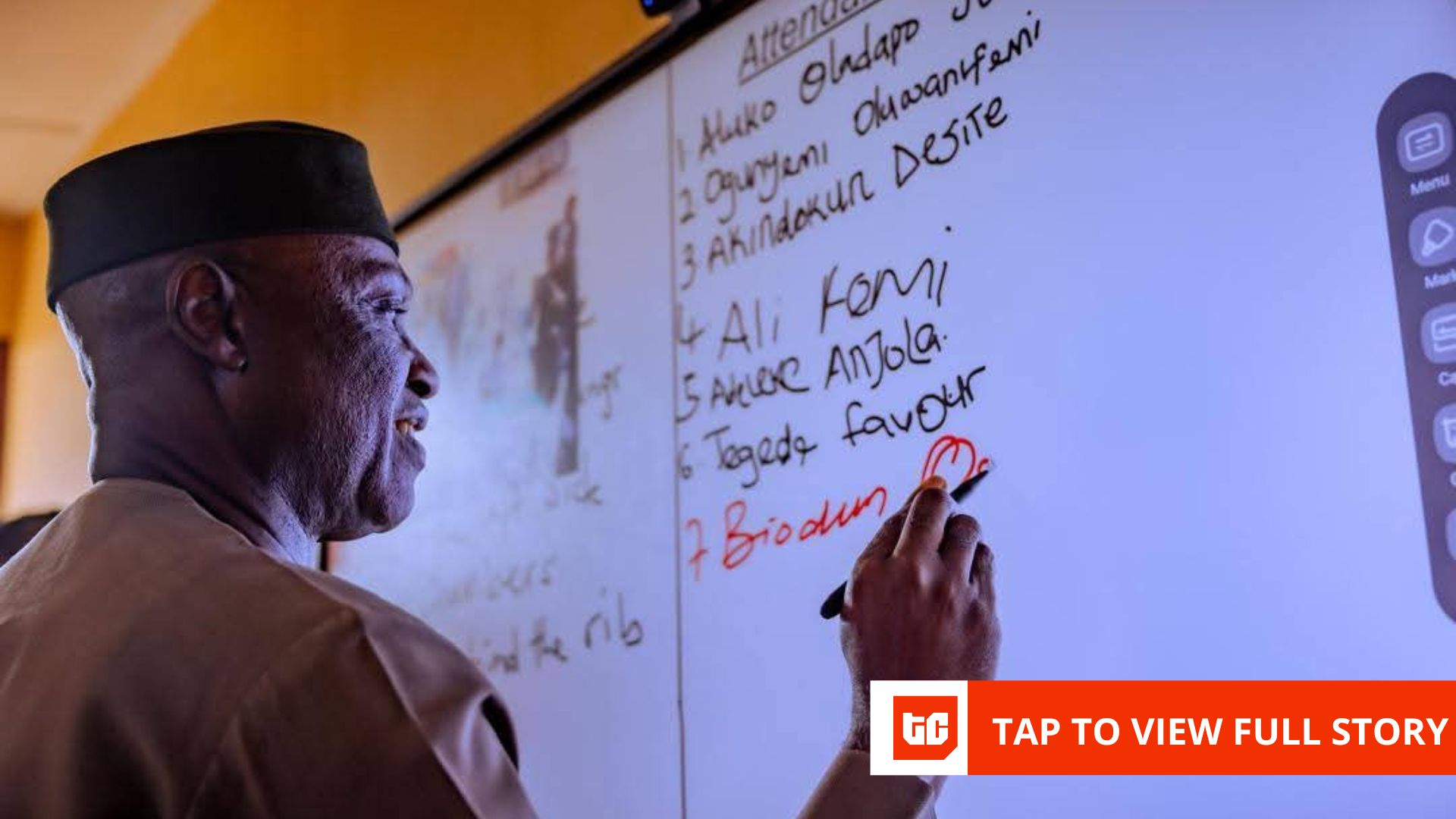Nestled in the rolling hills of southwestern Nigeria, Ekiti State is better known as the “Fountain of Knowledge,” a title its people embrace with pride. Education is not just valued here; it is deeply woven into the fabric of everyday life.
“In almost every family in Ekiti, you’ll find someone with a Master’s degree or a PhD,” said Esther Ajayi, a state government official in Ado Ekiti.
Now, the state is channeling that deep-rooted academic tradition into a new ambition: preparing its youth to lead in artificial intelligence (AI) and other emerging technologies.
As of 2024, despite being Nigeria’s fifth-smallest state, Ekiti has the third-highest literacy rate in Nigeria at 95.7%, and an out-of-school rate of only 9% making it the third most literate state in the country after Imo and Lagos states.
The state government, guided by future-oriented policymakers and grassroots tech entrepreneurs, is leveraging this intellectual legacy as its launchpad for growth in one of the world’s most transformative technologies: AI.
Making an ICT fit for AI
Fourteen months ago, a major reboot began at Ekiti’s Ministry of Innovation: the systematic revival and future-proofing of the state’s ICT policy.
“We brought back from the dead a long-standing ICT policy,” said Commissioner of Innovation, Science, and Digital Economy, Seun Fakuade. “It took intense, multi-disciplinary conversations with colleagues across ministries, introspection about where we stood, and a clear focus on what the future demands.” Fakuade was removed in a cabinet reshuffle on Sunday, August 10.
Rather than simply updating an old document, the ministry rewrote the policy, building in flexibility for yearly reviews and anchoring it firmly in present and future digital realities, including a robust AI component covering data governance, ethics, infrastructure, education, and AI use cases in governance, business, and public services.
Fakuade believes AI must serve three pillars: government-to-government, government-to-business, and government-to-citizen interactions. “AI is such a powerful force; it will define our history, the way the internal combustion engine changed the world,” he said. “It is non-negotiable that Ekiti participates and benefits from the fourth industrial revolution.”
Speaking AI in Ekiti’s voice
Commissioner Fakuade’s most passionate current project is unique: building a large language model fine-tuned for the Ekiti dialect—a rare and ambitious undertaking.
“Go online today and ask the biggest AI models to speak Ekiti: they’ll struggle,” he said. By partnering with local stakeholders, the state is documenting tonal nuances and local expressions, training AI to “properly translate as an Ekiti person speaking Ekiti language, not some phoneticised imitation.”
This AI-powered language bank carries deep significance. It offers a way to safeguard oral histories and cultural identities in a digital age where many languages are at risk of vanishing with the passing of older generations. According to Ethnologue, 454 languages have already gone extinct in recent centuries. UNESCO warns that at least 40% of the approximately 6,700 languages spoken today are either already lost or facing extinction.
The Ekiti language bank enables a future where filmmakers can animate authentic Ekiti voices, businesses can build voice bots with local credibility, and educational resources reach students in their mother tongue.
“If Google—or anyone—wants to buy out the state’s data, they must pay,” Fakuade said. “We will have invested in our language, our knowledge, and it will serve generations yet unborn.”
Infrastructure: the real engine under the hood
Great ideas need infrastructure. In the case of Ekiti, it is fibre optics, broadband, and reliable power. The state had approximately 1,178.04 km of fibre‑optic cables deployed as of 2023, making it one of the least covered.
“We can have the best policies and the best ideas, but if there is no connectivity, how does the world access them?” asked Fakuade.
In 2021, during the administration of former governor Kayode Fayemi, Ekiti became the first state to embrace the ₦145 per linear metre agreed for right of way by the National Economic Council, after slashing its ₦4,500 fee. That decision is gradually paying off with telecom operators deploying infrastructure within the state. IHS Towers and MTN Nigeria were the partners that worked on the Ekiti Internet Infrastructure for Public Institutions, also known as EKIREN, within the universities in Ekiti. There are ongoing talks with IHS Towers and Geniserve for a state-wide fibre cable deployment.
The state is also investing resources to power this widespread connectivity, government operations, and public schools. Fibre optic cables connect the State Secretariat, the Governor’s office, and an annex. The Ministry of Innovation and Digital Economy, which benefits from the internet infrastructure, has now gone completely paperless in all its operations. Public Institutions like Afe Babalola University (ABUAD), Ekiti State University (EKSU), Federal University Oye-Ekiti (FUOYE), and many secondary schools have also been connected by fibre optic cables.
However, Fakuade is clear-eyed about challenges: “Infrastructural stack for enabling AI is not where it ought to be, and this is not just for Ekiti, but Nigeria at large. But in Ekiti, we have a head start and a political will to close the gap.”
Building a self-sustaining knowledge economy
Ekiti’s greatest export may well be its brainpower. But that strength also poses a challenge for tech hub founders in the state, who are eager to see the talent they nurture remain local and drive the growth of Ekiti’s digital economy.
Lekan Ojuwole, who runs KinPlus Technologies, one of the 10 tech hubs in the state, says that of the more than 1,000 people he has trained in AI and software development, most relocate to Lagos, other parts of Nigeria, or overseas for work. Only a handful stay back to work remotely for foreign firms, join local companies, or start their ventures in Ekiti.
“Our focus now is on building AI products that can inspire our trainees to stay in Ekiti,” Ojuwole said. “We can’t all go to Lagos or Abuja. We need more people here, building the future from within the state.”
The brain drain also means that tech companies have to import experienced talent to work on special projects. PurpleBee Technologies, the largest tech hub located within Ado Ekiti, has engaged software engineers in Lagos and outside the country to work on some of its big projects, a few times.
“The talent is here—but we still need more experienced developers locally to execute big projects,” said Omotayo Idumoye, PurpleBee’s COO.
The government’s vision of building a self-sustaining knowledge economy anchored by the Ekiti Knowledge Zone may be a way to turn that intellectual capital inward. The Knowledge Zone, which is likely to open in 2026, will feature a “Life Sciences Knowledge Corridor” adjoining universities, a teaching hospital, and Ado Polytechnic.
“You can fly into Ekiti and do business with the Knowledge Zone, without visiting the metropolis,” Fakuade said, beaming. “We’re laying fiber, upgrading standards of living, and upskilling the people.”
Education reform starts early. Robust robotics, digital skills, and AI pilot programs begin as young as age seven in Ekiti State, which is modeled after education systems like Singapore. 400 students, aged 7 to 14, graduated from a robotics course in July. The bigger plan is to pilot, optimise, and then mainstream these programs across all schools in the state with development partners like the United Nations Development Programme (UNDP).
“The future is a child trained in Ekiti being globally competitive with anyone, anywhere,” Fakuade said.
But as Fakuade is the first to admit, challenges remain. “We need to retool not just our students, but our teachers—many were trained on programming languages now considered obsolete, and not all have the equipment or skills required. Good intentions alone won’t suffice.” He emphasised the need for systemic teacher training, partnerships, and salary reforms to attract high-caliber educators who can teach next-gen tech.
Innovation with local roots
The Ekiti State government is leveraging partnerships with homegrown tech hubs such as McKodev Tech Lab, Kinplus, and PurpleBee Technologies to address critical skills gaps in digital and AI literacy. These collaborations reflect a deliberate shift toward community-based innovation, where training programs are rooted in local realities—limited access to power, data, and capital—yet designed to meet global technology standards. With targeted support and institutional backing, these hubs are delivering hands-on training in programming, software development, and AI, reaching hundreds of young people across the state and beyond.
McKodev Tech Lab, founded by Banji Akole, is developing “Afrocentric” technologies: solutions designed specifically for African contexts. Rejecting the one-size-fits-all approach of foreign tech imports, McKodev trains software engineers with a curriculum focused on local relevance and sustainability. Over 200 developers from Ekiti and neighboring states have come through the program, gaining foundational skills and practical experience through real-world projects. One of the lab’s flagship innovations, OctopusVAI, enables small business owners to generate fully functional websites—complete with content and visuals—in just minutes using AI.
After years of bootstrapping the business, the company is now seeking venture capital funding to scale its AI ambitions. “The type of programs and features we are building into OctopusVAI isn’t something we can fund on our own,” said Akole.
Kinplus, led by Lekan Ojulowo, has taken a similar approach, scaling its reach through collaborations with the state and federal institutions like the National Information Technology Development Agency (NITDA). With more than 1,000 young people trained in software and app development, the hub is now integrating AI into its curriculum. A new project uses generative AI to create original imagery, exposing trainees to the intersection of creativity and machine learning, and positioning them for opportunities in design, media, and digital content creation. Despite continued challenges with talent retention, Kinplus remains focused on creating reasons for tech talent to build their futures within Ekiti.
Homemade AI tool already in use in Ekiti public schools
PurpleBee Technologies, founded by Dapo Oriola, illustrates how AI can be harnessed to drive public sector transformation. Its flagship innovation, the PurpleBee Result Vault (PBRESULT), built by a local team of software engineers, is an AI-powered result management platform developed by teams in Ekiti and beyond. Now deployed in 20 public secondary schools, the system digitises grading, centralises student records, and gives parents and teachers real-time access to academic performance data. Education officials also benefit from a centralised dashboard that provides instant visibility into student populations, teacher allocation, and overall school performance, enabling faster, data-driven decisions across the state’s education system.
Rather than building tech leadership from infrastructure alone, Ekiti is cultivating a decentralised innovation ecosystem powered by its people.
But the vision is not naïve. Commissioner Fakuade and Ekiti’s young tech leaders are candid about the obstacles: infrastructural gaps, inadequate teacher reskilling, and persistent outflow of local talent to wealthier cities or countries. “Change management is essential. Systemic reform, incentives, and an entrepreneurial ecosystem are how we’ll leap,” Fakuade said.
This report was produced with support from the Centre for Journalism Innovation and Development (CJID) and Luminate.
Mark your calendars! Moonshot by is back in Lagos on October 15–16! Join Africa’s top founders, creatives & tech leaders for 2 days of keynotes, mixers & future-forward ideas. Early bird tickets now 20% off—don’t snooze! moonshot..com












